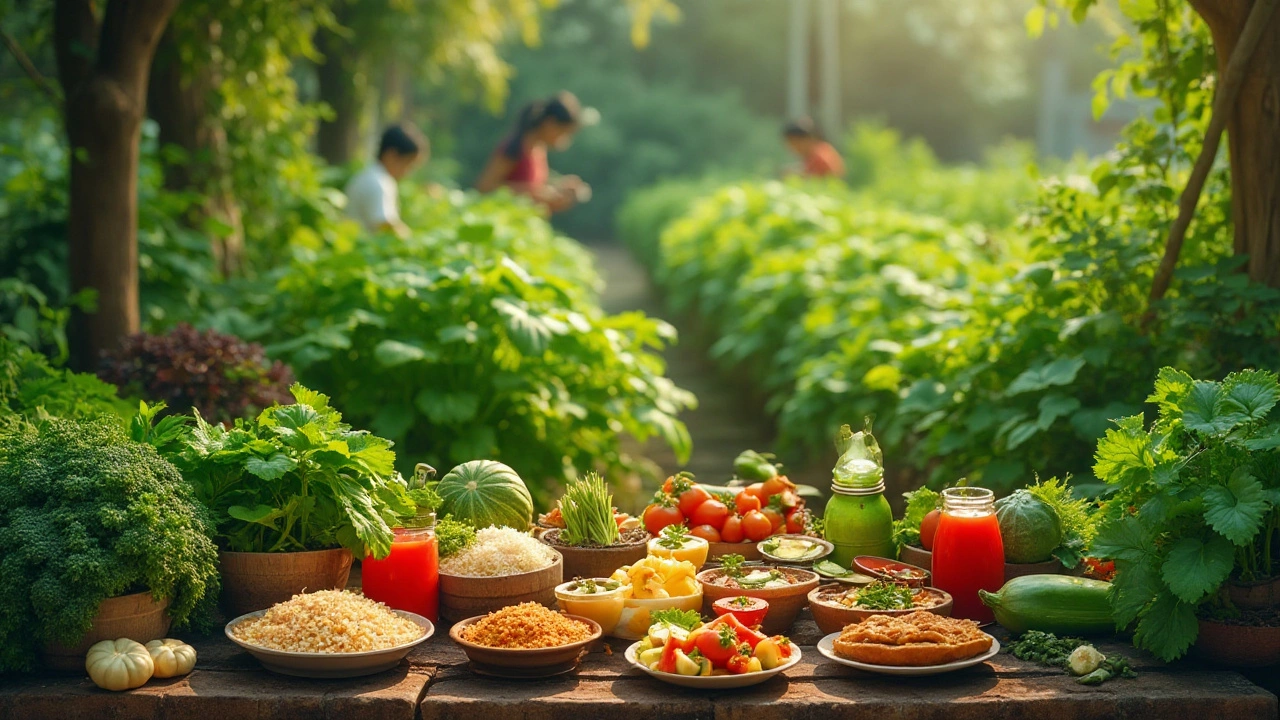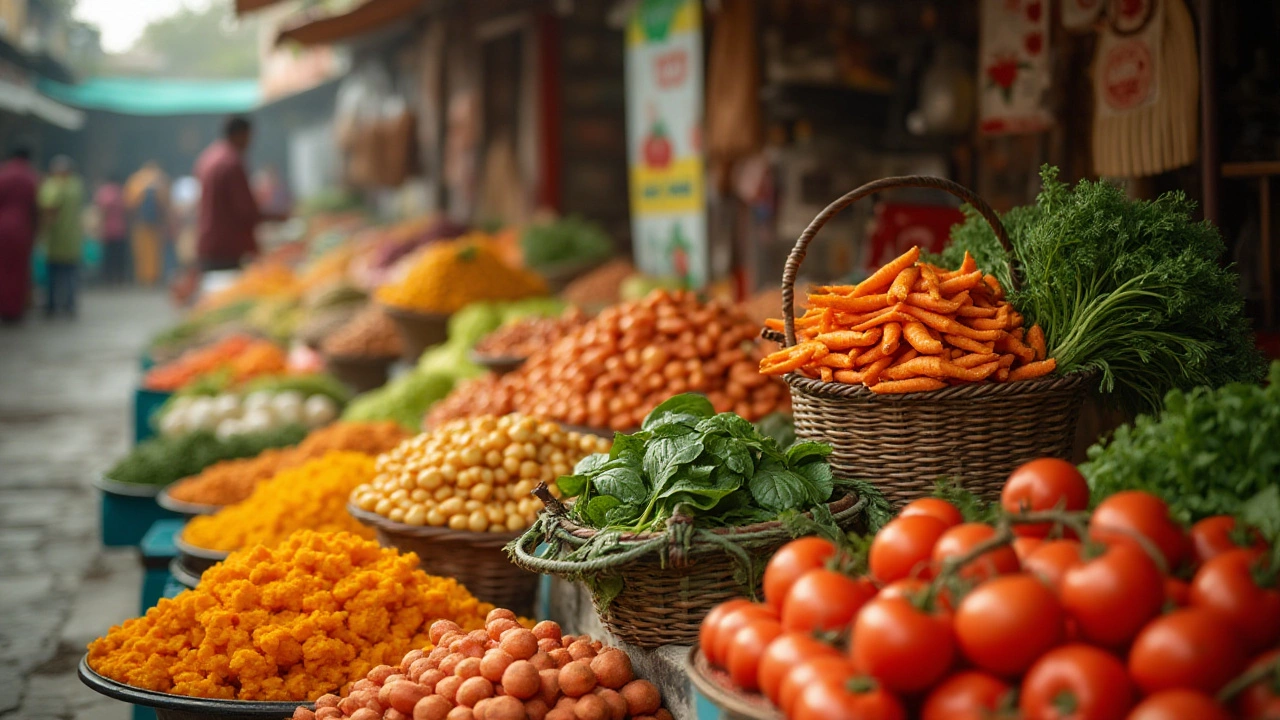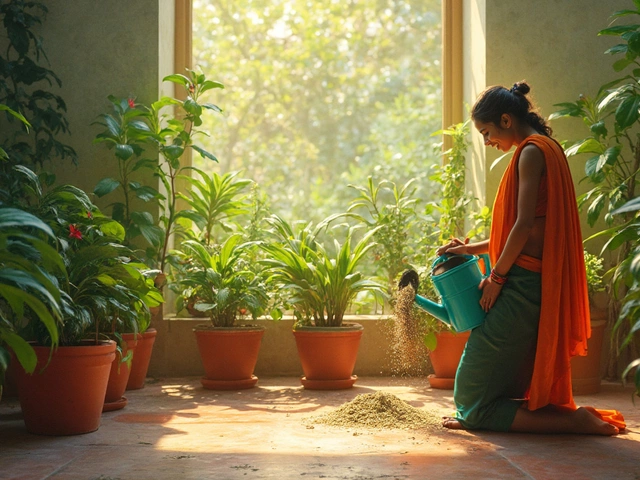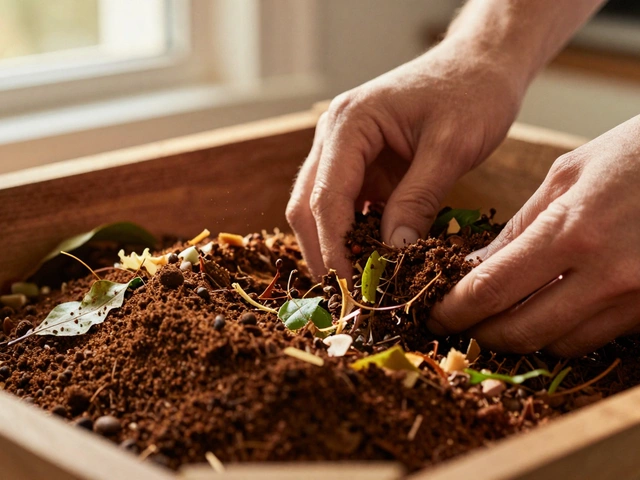The quest for healthier living starts with understanding what foods might be pulling us down. In a country as diverse as India, the array of food choices is both a blessing and a challenge. Not all that glitters in your kitchen is gold; some foods, despite their appeal, can be detrimental to health.
In the fast-paced life of today, convenience often trumps nutrition, leading many to consume foods that are packed with unhealthy ingredients. But what if I told you that the path to healthier eating could be right outside your door? With vegetable gardening gaining ground across India, there's a growing movement towards cultivating one's own produce, offering a fresh start to a healthier diet.
Ready to explore the world of vegetable gardening? This article will guide you through the pitfalls of unhealthy eating and open up a world of bountiful, home-grown alternatives. Grow your own goodness and embrace a healthier lifestyle with your personal garden of eden.
- Understanding Unhealthy Foods
- The Impact of Junk Food Consumption
- Healthier Food Alternatives in Gardening
- Tips for Vegetable Gardening in India
- Benefits of Growing Your Own Produce
Understanding Unhealthy Foods
Unraveling the complexities of unhealthy foods is much like embarking on a journey across an intricate culinary labyrinth. Fast food establishments, those neon-lit beacons of quick satisfaction, often rely on ingredients that fuel the body in all the wrong ways. Think of it as a stealthy invasion where your taste buds dance with delight while your health quietly suffers. From trans fats to added sugars, these protagonists rule the stage in many of the choices labeled as junk food.
Why do you think these foods hold such a firm grip on our desires? It's not just the alluring aroma of a sizzling fry or the crispy outer layer of fried delights. The pull is as psychological as it is physical, woven into the convenience of a bustling lifestyle. On this note, let's lend our ears to Michael Pollan, who stated,
Eat food, not too much, mostly plants.This simple truth sheds light on how plant-based eating can steer us away from the temptations of unhealthy cuisine.
But what do we find in these calorie-laden treats that make them so unworthy of a regular spot on your plate? Start with the refined carbohydrates, which are stripped of essential nutrients during processing. They are the culprit behind spikes in blood sugar, depriving your body of the steady energy it deserves. Add to this list sodium, a hidden villain in disguise, elevating blood pressure and taxing the heart. If you think a slice of processed cheese is innocent fare, consider the preservatives and real cheese scarcity that accompany it. The script unfolds like a detective novel where clues aren’t obvious but their effects are felt over time.
Diving deeper, vegetable gardening could offer an enlightening shift. Our modern palette, fraught with processed foods, sometimes needs re-education. The bounty of natural produce grown in a garden not only offers a remedy with its abundance of vitamins and minerals but also a return to simplicity and authenticity. No preservatives lurking in the shadows, just the raw, untainted vigor of fresh produce. Start with leafy greens, a powerhouse of nutrients, or consider antioxidant-rich tomatoes, which paint your dishes with a splash of health.
Curating a food list, it's beneficial to bear in mind some indicators of undesired dietary choices. If you encounter labels with numerous unpronounceable ingredients, pause and reconsider. Excessive sugars, fats that clog the arteries, and salts that dehydrate the system all hint at why moderation or avoidance becomes essential. Integrating this awareness into your daily choices offers a chance to pivot toward harmony with your body. It's not merely a diet shift but a lifestyle choice that promises lasting positive change.
Enthusiasm for healthy living is spreading like wildfire. Discovering healthy alternatives via gardening inspires individuals to reclaim control over food sources. While supermarkets can groan under the weight of processed options, a backyard garden teems with promise and nutrition. It's as if you're given the keys to a kingdom where greens reign supreme, and unhealthy foods yield the sovereignty. Adopting this lifestyle doesn't just change what’s on your plate; it transforms your connection with food. In this way, understanding and then choosing wisely can lead us not only to a healthier diet but a more sustainable future.
The Impact of Junk Food Consumption
In recent years, the rise of fast food and processed snacks has been nothing short of astronomical. As convenience becomes a primary driver in our food choices, many have fallen into the trap of indulging in items laden with unhealthy fats, sugars, and salt. These unhealthy foods, often dubbed 'junk food', offer little nutritional value yet pack high calories which lead to an array of health issues. From obesity to heart diseases, and even diabetes, the long-term impact on the body is severe. Unfortunately, the allure of tantalizing flavors makes it all the more difficult for individuals to resist these temptations.
Many studies highlight how regular consumption of these foodstuffs is gradually replacing traditional, nutritious meals. In this battle against health, shifting from junk to wholesome meal plans is crucial. Not only do these foods contribute to physical health problems, but they also have a mental health component that is often overlooked. Overconsumption is linked to mood swings and reduced cognitive function. The easy accessibility and lower cost of these foods pose an even greater challenge to adopting healthier habits, particularly in fast-paced urban environments.
"People are fed by the food industry that pays no attention to health and treated by the health industry that pays no attention to food." - Wendell Berry
The economic burden is equally daunting. Health complications arising from poor dietary habits increase healthcare costs substantially. As consumers spend more on treating diseases linked to junk food, budgets that could be directed towards healthier food or recreational activities get compromised. It becomes a vicious cycle where the choice of convenience ultimately places a greater weight on societal resources, affecting not just individuals but family units and larger communities.
Table statistics on global consumption patterns reveal alarming trends. For example:
| Year | Global Fast Food Revenue (in billion USD) |
|---|---|
| 2020 | 644 |
| 2023 | 749 |
| 2025 | 832 (projected) |
The data indicates an upward trajectory that serves as a wake-up call for cultivating awareness. It’s important for individuals and families to become proactive, steering away from junk foods and towards healthier alternatives. This transition, although complex, is conceivable with access to proper information and the motivation to bring a change. As we pivot to vegetable gardening, it serves as a practical method to counteract the negatives of junk food consumption, providing fresh and nutritious produce right in our backyards or balconies, making healthy living accessible and feasible.

Healthier Food Alternatives in Gardening
When it comes to adopting healthier eating habits, growing your own vegetables in a garden might just be the game-changer you need. As the trend of vegetable gardening sweeps across India, it offers an excellent opportunity to cultivate foods that not only taste better but also provide higher nutritional value. Unlike store-bought vegetables that may have been treated with pesticides or traveled long distances, home-grown produce enables you to have complete control over what ends up on your plate.
The experience of gardening itself can be rewarding beyond measure. It requires patience, care, and a connection with nature that is often missing from our fast-paced lives. Each vegetable grown in your backyard is a testament to your effort, filled with minerals and vitamins essential for maintaining good health. Planting a variety of vegetables, from tomatoes and chilies to spinach and okra, ensures that your diet is diverse and full of vibrant flavors.
As Mahatma Gandhi once said, "To forget how to dig the earth and to tend the soil is to forget ourselves."
Incorporating healthy alternatives into your diet through gardening can significantly reduce reliance on unhealthy food options that are prevalent in today's market. For example, sweet potatoes can be a nutritious substitute for regular potatoes. They're rich in fiber and vitamin A, making them a smart choice for weight management. Leafy greens like kale and spinach are packed with iron and calcium, crucial for bone health. By growing organic herbs such as basil and mint, you can add a burst of flavor to your meals without the added sodium often found in packaged seasonings.
| Vegetable | Nutritional Benefit |
|---|---|
| Sweet Potatoes | High in fiber, vitamin A |
| Spinach | Rich in iron, calcium |
| Kale | Contains antioxidants, vitamin C |
The benefits of vegetable gardening extend beyond just personal health. It also contributes to environmental sustainability. By planting your produce, you're reducing reliance on packaged goods, which often come with excess plastic waste. Moreover, the plants in your garden help to support biodiversity and can attract essential pollinators like bees and butterflies. Engaging in gardening practices also encourages a sense of community through the sharing of seeds, tips, and harvests among neighbors and friends, fostering a collective movement towards better health and environment.
Tips for Vegetable Gardening in India
Venturing into vegetable gardening in India is both an exciting and rewarding journey. Given its diverse climate, India offers a unique opportunity for gardening enthusiasts to grow a wide variety of vegetables year-round. However, success in this green endeavor requires careful planning and understanding of local conditions. Choosing the right vegetables according to the seasons is crucial. For instance, leafy greens like spinach and fenugreek thrive in cooler months, while tomatoes and eggplants prefer the hotter season. Assessing local agricultural calendars can help determine the ideal planting timings to ensure a bountiful harvest. Testing soil quality is also essential. A fertile, well-draining soil enriched with organic compost can significantly improve crop yield.
Moreover, understanding the water needs of each plant is vital for healthy produce. In many regions of India, water can be a limiting resource, and efficient water management techniques like drip irrigation or rainwater harvesting can be sustainable solutions. These techniques not only conserve water but also provide consistent moisture levels, which are necessary for plant growth. Creating an organic compost pile from kitchen scraps and garden waste is another effective way to provide nutrients to your plants. This not only reduces household waste but also enriches the soil naturally, eliminating the need for chemical fertilizers. Another important tip involves protecting plants from pests and diseases using natural remedies such as neem oil which, as studies suggest, is effective in controlling insects and mites.
According to Dr. Vandana Shiva, "Organic farming and traditional seed systems are truly the way forward for food security and tackling climate change."
Consider the spacing between plants to avoid overcrowding, which can lead to poor air circulation and increase the risk of diseases. Plant vegetables in rows or raised beds, which promote better drainage and can be more manageable in smaller spaces. Companion planting, integrating plants that naturally support each other's growth, can also reduce pest issues and encourage better yields. For instance, planting marigolds near vegetables is known to repel harmful nematodes and attract beneficial insects. Monitoring and regularly maintaining the garden ensures plants receive the care they need, including timely pruning and removal of weeds, which can steal nutrients from your precious veggies.
Choosing the Right Tools
Investing in good quality gardening tools can make the process smoother and more enjoyable. Basic tools such as a garden trowel, pruning shears, and a watering can are necessary for any gardener. Opt for sturdy tools that can withstand frequent use and are appropriate for the size of your garden. Equipment like a compost bin, plant markers, and seed trays can also enhance the gardening experience.
Utilizing Space Efficiently
For those gardening in urban environments where space is limited, container gardening is an excellent alternative. Using pots, grow bags, or vertical gardening systems can make it possible to cultivate vegetables like chillies, coriander, or mint even in small balconies. Innovatively using space, such as windowsills and rooftop gardens, can also dramatically increase your growing area. Collaborating with community gardening projects can share resources and foster a sense of community while growing food sustainably.

Benefits of Growing Your Own Produce
Growing your own vegetable gardening in India is not just about cultivating wholesome foods; it's a rewarding journey that significantly contributes to a healthier lifestyle. One of the prominent benefits is the assurance that you know exactly what goes into your soil and onto your plants. By avoiding harmful pesticides and opting for organic composts, you ensure that the produce you bring to your table is pure and chemical-free. It's an empowering feeling, knowing that every bite of a juicy tomato or crisp lettuce is a product of your hands and care, directly impacting your well-being.
Besides the unmistakable flavor of freshly picked vegetables, growing your own produce can also offer significant cost savings. While the initial investment in seeds and gardening tools might seem substantial, the returns are manifold. Over time, as your garden grows, your trips to the market decrease, saving money that would have been spent on purchasing commercial vegetables, which often include hidden costs for packaging and transport. The joy of watching your garden turn into a mini supermart for your household is unmatched, providing not just economic but emotional satisfaction.
Health benefits extend beyond just the organic nature of home-grown produce; the physical activity involved in maintaining a garden is a great workout. Gardening requires certain physical tasks like planting, watering, weeding, and harvesting, all of which can be considered light to moderate exercise. According to the Centers for Disease Control and Prevention, gardening can burn up to 330 calories per hour. For those who are looking to add physical activity into their daily routine, gardening offers the dual benefit of exercise and the joy of connecting with nature.
"In every gardener, there is a child who loves to play in the dirt. In every chef, there is a gardener who loves to grow," says Oprah Winfrey, capturing the timeless joy of nurturing life from the soil.
Another plus is that vegetable gardening increases biodiversity. By growing a variety of plants, you support ecosystems that encourage beneficial insects like bees and butterflies, contributing positively to your local environment. This biodiversity can lead to better pollination and stronger crops, creating a natural balance that helps fend off diseases and pests without resorting to synthetic solutions. It's a win-win for both plants and planet, reinforcing the cycle of nature that benefits everyone involved.
- Emphasize the nutritional superiority of home-grown vegetables, which are often richer in vitamins and minerals;
- Recognize the environmental benefits, as growing your own food reduces your carbon footprint;
- Appreciate the mental health benefits, as tending to plants has been shown to reduce stress and anxiety.
Growing your own produce is not just a hobby; it's a lifestyle choice toward sustainable living. In the heart of India's diverse climate, every garden can be an oasis of health, community, and harmony with nature. By embracing this method of nurturing from seed to table, we take a step towards healthier eating and a healthier planet. And each harvest reaffirms a commitment to a lifestyle that values effort, patience, and the simple joys of life.





